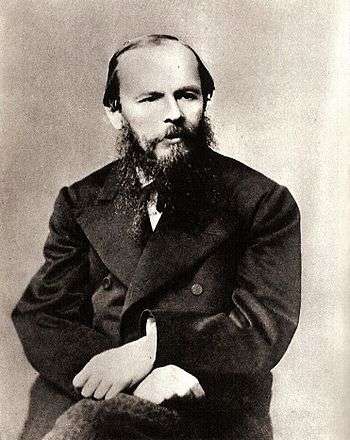Fyodor Dostoevsky

"[Dostoevsky is] the only psychologist from whom I have something to learn."
"What terrible tragedies realism inflicts on people."—from The Brothers Karamazov
Fyodor Mikhailovich Dostoevsky was a 19th century Russian author, famous for writing Notes From Underground, Crime and Punishment, The Idiot, and The Brothers Karamazov. A deeply philosophical writer with a nuanced understanding of human psychology, Dostoevsky is credited with being, depending on your view, either a forerunner or a founder of modern existentialism.
The funny thing about Dostoevsky is that he's really two different authors separated by a four year stretch of exile to Siberia in 1849. Pre-1849, Dostoevsky wrote two novels (Poor Folk and the incomplete Netochka Nezvanova) and several short stories and novellas. He's really remembered, however, for the work he turned out after he came back from exile. Having had a religious experience while in prison, he spent the rest of his life exploring themes such as free will, guilt, religious awakening, and the effects of nihilism. His most famous novels are all critically-acclaimed for being thought-provoking explorations of the human condition in the face of suffering and despair.
Dostoevsky is known as "the Mad Russian" for two reasons:
- Something that tends to throw some readers off is that Dostoevsky's characters are all mad. Not literally mad, but they are all motivated by ideas instead of normal human drives. Because of this, several of the characters across his oeuvre tend to fall into molds or archetypes based on the ideas they represent (Sonya from Crime and Punishment and Alyosha from The Brothers Karamazov fall into a distinct category, as do Raskolnikov and Ivan Karamazov from the same books respectively), and his characters and their actions are symbolic of these ideas.
- As a reaction against the European philosophies that were becoming popular in Russia in his time, Dostoevsky wrote in a rural, slavophilic/Russian style, emphasizing national unity and what would be the equivalent of "family values" in 19th century Russia.
Or maybe he was called "the Mad Russian" because the mindgames in his plots are so mind-bendingly complex one has to be mad to understand them. They devote university seminars to studying Dostoevsky's prose, and they can get away with it because the symbolism is real.
- Author Tract: Liable to appear at any given time in his books.
- Byronic Hero: Stavrogin from The Possessed.
- Character Filibuster: See Author Tract above.
- Christianity Is Catholic: Averted. Although he was a devout Christian, Dostoevsky loathed Catholicism (especially the Jesuits), and he saw the raw, innocent spirituality of Russian Orthodoxy as an antidote to it. An Author Filibuster in The Idiot is devoted to this.
- Deceased Fall Guy Gambit: A important plot point in The Possessed.
- Downer Ending: The Idiot, to a certain degree The Possessed as well.
- Jekyll and Hyde: The early novella The Double, as you might have guessed from the title.
- The Masochism Tango: The marriage in the short story 'A Gentle Creature'. (Alternately, the relationship between any given Dostoevsky character and any other given Dostoevsky character.)
- Mind Screw: Of course!
- Nice Guys Finish Last: The protagonist in the story 'White Nights'.
- Nietzsche Wannabe: Many, including pretty much all the young radicals in The Possessed (although Stavrogin and Verkhovensky stand out), and Arkady in The Adolescent.
- Reign of Terror: Dostoevsky saw this as the inevitable outcome of radical movements, as he illustrates in The Possessed.
- Sliding Scale of Idealism Versus Cynicism: Dostoevsky's books tend to break the scale, as they have the entire range of behavior -- from the most idealistic to the most cynicial, with everything in between -- existing at the same time, while being inconclusive as to what wins out.
- Tsundere/Tsunshun: Many of Dostoevsky's female characters fit into one of these types (see the pages for more details). As did Dostoevsky's Real Life mistress Apollinaria Suslova, which may explain some things.
- Wife Husbandry: Taken to a nasty extreme in the short story 'A Christmas Tree and a Wedding'.